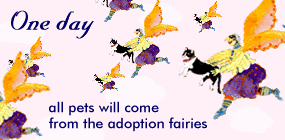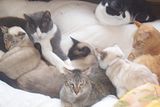Black Jellybeans
By Margie Seyfer





I've never read an official study on the matter, but I've noticed that
in animal shelters, black cats are the most overlooked. Black seems
to be the least preferred of cat colors, ranking below all combinations
of white, orange, gray, spotted and striped.
Black cats are still stereotyped as Halloween cats, creatures of bad
luck, more appropriate on a witch's broomstick than curled up on your
pillow. To make matters worse, in cages, black cats become close to
invisible, fading into the dark shadows in the back of a stainless-steel
cage.
For eleven years, starting when I was 10 years old, I volunteered at an
urban animal shelter. It always struck me as particularly unfair
that, time after time, I'd get to know affectionate, adorable black
cats, only to watch them be passed over by adopters merely because of
their color. I assumed there was nothing that could be done.
One day, many years into my work at the shelter, I spent a few minutes
petting a sweet, black half-grown kitten, who had been found as a stray
and brought to the shelter. The slender thing purred warmly at my
attention, gently playful as she patted my hand with one paw.
I thought about what a shame it was that the kitten was already too big
to be adopted on baby-kitten appeal alone, and so solidly black that
most people wouldn't even pause in front of her cage. I noticed there
was no name written on the informational card on her cage.
Since volunteers were welcome to name the strays that came to the
shelter, I thought for a moment about what I could name this black
kitten. I wanted to think of a name that could give the kitten the
kind of appealing "color" that might encourage an adopter to take a
second look.
The name Jellybean popped into my head, and I wrote it on the card, just
as I'd named thousands of cats in the past.
I was taken entirely by surprise when, later that afternoon, I overheard
a woman walking through the cat room say, "Jellybean! What a
wonderful name!"
She stopped to look more closely at the kitten, now batting at a piece
of loose newspaper in the cage. She asked me if she could hold
Jellybean, and, as I opened the cage, I sheepishly admitted that the
kitten didn't know her name, as I'd named her just hours before.
I lifted her into the woman's arms, and the kitten leaned into the
woman, looking up into her eyes with a purr of kitten bliss. After a
few minutes, the woman told me that she'd like to adopt this black
kitten, and, when the paperwork was approved a few days later, she took
Jellybean home.
I was pleased, of course - adoptions were always what nourished my soul
- but I chalked it up to a lucky break for one black kitten, and moved
on.
I was surprised again a few weeks later when the woman came back to the
shelter. She found me refilling water bowls in a cat room and said,
"You were the one who helped me adopt that black kitten a few weeks ago,
remember?
"Jellybean? I know you were the one who named her, and I've been
wanting to stop back to thank you. She's the sweetest thing - I just
love her to pieces. But I don't know if I would have noticed her if
she hadn't had that great name.
It just suits her perfectly. She's so bouncy and colorful - I know
that sounds crazy. Anyway, I wanted to say thank you."
I told her I was touched that she had stopped by and thrilled to hear
that Jellybean was doing well in her new home.
Then I explained how I thought black cats were often unfairly overlooked
and admitted the name had been my conscious attempt to get someone to
notice a cat who would probably not have been adopted otherwise.
She said, "Well, it worked! You should name all the black cats
Jellybean."
I smiled politely at the suggestion, thinking to myself that this woman
knew nothing of the harsh realities of animal shelters. Just because
I named one kitten Jellybean and it had gotten adopted didn't mean
anything - it had just been a stroke of luck.
Black cats were still black cats, after all, and most people didn't want
them.
As the day went on, I kept thinking about the woman's advice: "You
should name all the black cats Jellybean." As crazy as it seemed, I
decided I had nothing to lose.
Pen in hand, I walked along the cages, looking for a black cat without a
name. There was only one, a small black kitten alone in a cage,
sleeping. I wrote "Jellybean" on its cage card.
Later that afternoon, someone came along and said they'd like to adopt
that little Jellybean. Well, I thought to myself, that wasn't really
a fair test - it was so cute and tiny.
A few days later, a nameless black cat came along, fully grown. I
named it Jellybean. It was adopted. Days later, another.
Adopted. The process repeated itself enough times that, after a
while, I had to admit that maybe there was some magic in the name, after
all.
It began to seem morally wrong not to name black cats Jellybean,
especially ones who had a bounce in their step and a spark of joy in
their eyes.
Although I'd usually refrained from using the same name for more than
one cat, after a while, my fellow volunteers ceased to be surprised when
they came across another of my Jellybeans.
Of course, we'll need more far-reaching solutions to ensure that every
cat has a home. But for my black Jellybeans, sitting in sunny
windows, sniffing at ladybugs walking across the kitchen floor,
snuggling in beds with their adopted people, a name made all the
difference.
"Jellybean" allowed some humans to see beyond a dark midnight coat into
the rainbow of riches in a cat's heart.








 Reply With Quote
Reply With Quote





 Well of course I didn't take her back and the rescue waived my adoption fee since I had such big vet bills. They said they were just thrilled that a black kitty got a home.
Well of course I didn't take her back and the rescue waived my adoption fee since I had such big vet bills. They said they were just thrilled that a black kitty got a home. 

 12/02
12/02




Bookmarks